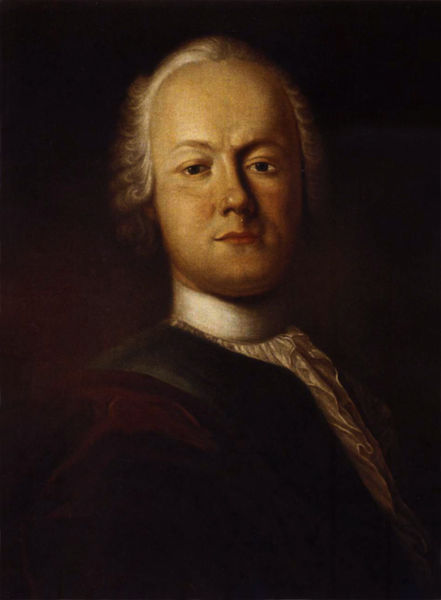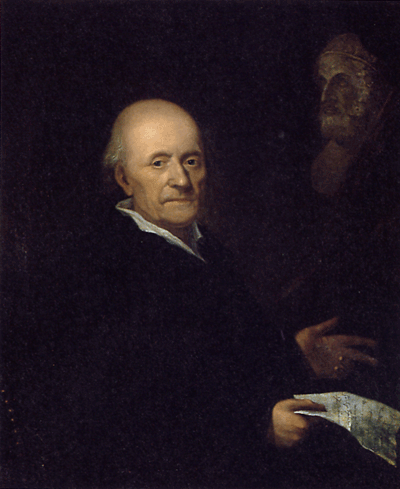<Back to Index>
- Physicist Hans Albrecht Bethe, 1906
- Poet Friedrich Gottlieb Klopstock, 1724
- President of Argentina Carlos Saúl Menem, 1930
PAGE SPONSOR


Friedrich Gottlieb Klopstock (2 July 1724 – 14 March 1803) was a German poet.
Klopstock was born at Quedlinburg, the eldest son of a lawyer. Both in his birthplace and on the estate of Friedeburg on the Saale, which his father later rented, young Klopstock passed a happy childhood; and more attention having been given to his physical than to his mental development he grew up a strong healthy boy and was an excellent horseman. In his thirteenth year Klopstock returned to Quedlinburg where he attended the gymnasium, and in 1739 proceeded to the famous classical school of Schulpforta. Here he soon became an adept in Greek and Latin versification, and wrote some meritorious idylls and odes in German. His original intention of making Henry the Fowler the hero of an epic, was, under the influence of Milton's Paradise Lost with which he became acquainted through Bodmer's translation, abandoned in favour of the religious epic.
While yet at school, he had already drafted the plan of Der Messias, upon which his fame mainly rests. On 21 September 1745 he delivered on quitting school a remarkable "leaving oration" on epic poetry — Abschiedsrede über die epische Poesie, kultur - und literargeschichtlich erläutert — and next proceeded to Jena as a student of theology, where he elaborated the first three cantos of the Messias in prose. The life at this university being uncongenial to him, he removed in the spring of 1746 to Leipzig, and here joined the circle of young men of letters who contributed to the Bremer Beiträge. In this periodical the first three cantos of the Messias in hexameters were anonymously published in 1748.
A new era in German literature had commenced, and the name of the author soon became known. In Leipzig he also wrote a number of odes, the best known of which is An meine Freunde (1747), afterwards recast as Wingolf (1767). He left the university in 1748 and became a private tutor in the family of a relative at Langensalza. Here unrequited love for a cousin (the "Fanny" of his odes) disturbed his peace of mind. Gladly therefore he accepted in 1750 an invitation from Bodmer, the translator of Paradise Lost, to visit him in Zürich. Here Klopstock was at first treated with every kindness and respect and rapidly recovered his spirits. Bodmer, however, was disappointed to find in the young poet of the Messias a man of strong worldly interests, and a coolness sprang up between the two friends.
At this juncture Klopstock received from Frederick V of Denmark, on the recommendation of his minister Count von Bernstorff (1712 – 1772), an invitation to settle at Copenhagen, with an annuity of 400 thalers, with a view to the completion of the Messias. The offer was accepted; on his way to the Danish capital Klopstock met at Hamburg the lady who in 1754 became his wife, Margareta (Meta) Möller, (the "Cidli" of his odes), an enthusiastic admirer of his poetry. His happiness was short; she died in 1758, leaving him almost broken - hearted. His grief at her loss finds pathetic expression in the fifteenth canto of the Messias.
The poet subsequently published his wife's writings, Hinterlassene Werke von Margareta Klopstock (1759), which give evidence of a tender, sensitive and deeply religious spirit. Klopstock now relapsed into melancholy; new ideas failed him, and his poetry became more and more vague and unintelligible. He still continued to live and work at Copenhagen, and next, following Heinrich Wilhelm von Gerstenberg, turned his attention to northern mythology, which he conceived should replace classical subjects in a new school of German poetry. In 1770, on the dismissal by King Christian VII of Count Bernstorff from office, he retired with the latter to Hamburg, but retained his pension together with the rank of councillor of legation.
Here, in 1773, he issued the last five cantos of the Messias. In the following year he published his strange scheme for the regeneration of German letters, Die Gelehrtenrepublik (1774). In 1775 he travelled south, and making the acquaintance of Goethe on the way, spent a year at the court of the margrave of Baden at Karlsruhe. Thence, in 1776, with the title of Hofrath and
a pension from the margrave, which he retained together with that from
the king of Denmark, he returned to Hamburg where he spent the
remainder of his life. His latter years he passed, as had always been
his inclination, in retirement, only occasionally relieved by
association with his most intimate friends, busied with philological studies, and hardly interesting himself in the new developments of German literature.
The American War of Independence and the Revolution in France aroused him, however, to enthusiasm. The French Republic sent
him the diploma of honorary citizenship; but, horrified at the terrible
scenes the Revolution had enacted in the place of liberty, he returned
it. When sixty - seven years of age he contracted a second marriage with
Johanna Elisabeth von Winthem, a widow and a niece of his late wife,
who for many years had been one of his most intimate friends. He died
at Hamburg on 14 March 1803, mourned by all Germany, and was buried
with great pomp and ceremony by the side of his first wife in the
churchyard of the village of Ottensen. Klopstock's
nature was best attuned to lyrical poetry, and in it his deep, noble
character found its truest expression. He was less suited for epic and
dramatic representation; for, wrapt up in himself, a stranger to the
outer world, without historical culture, and without even any interest
in the events of his time, he was lacking in the art of plastic
representation such as a great epic requires. Thus the Messias, despite the magnificent passages which especially the earlier cantos contain, cannot satisfy the demands such a theme must necessarily make. The subject matter, the Redemption, presented serious difficulties to adequate epic treatment. The Gospel story was too scanty, and what might have been imported from without and
interwoven with it was rejected by the author as profane. He had
accordingly to resort to Christian mythology; and here again, circumscribed by the dogmas of the Church, he was in danger of trespassing on the fundamental truths of the Christian faith. The personality of Christ could scarcely be treated in an individual form, still less could angels and devils; and in the case of God Himself it was impossible. The result was that, despite the groundwork — the Gospels, the Acts of the Apostles, the Revelation of St John, and the model ready to hand in Milton's Paradise Lost —
material elements are largely wanting and the actors in the poem,
divine and human, lack plastic form. That the poem took twenty - five
years to complete could not but be detrimental to its unity of design;
the original enthusiasm was not sustained until the end, and the earlier cantos are far superior to the late ones. Thus
the intense public interest the work aroused in its commencement had
almost vanished before its completion. It was translated into seventeen
languages and led to numerous imitations. In his odes Klopstock had
more scope for his peculiar talent. Among the best are An Fanny; Der Zürchersee; Die tote Klarissa; An Cidli; Die beiden Musen; Der Rheinwein; Die frühen Gräber, Mein Vaterland. His religious odes mostly take the form of hymns, of which the most beautiful is Die Frühlingsfeier. His dramas, in some of which, notably Hermanns Schlacht (1769) and Hermann und die Fürsten (1784), he celebrated the deeds of the ancient German hero Arminius, and in others, Der Tod Adams (1757) and Salomo (1764), took his materials from the Old Testament; are essentially lyrical in character and deficient in action. In addition to Die Gelehrtenrepublik, he was also the author of Fragmente über Sprache und Dichtkunst (1779) and Grammatische Gespräche (1794), works in which he made important contributions to philology and to the history of German poetry. His
enrichment of the poetic vocabulary and his attention to prosody were
of great service to the poets that immediately followed him. In freeing German poetry from the exclusive reign of the Alexandrine verse, he was the founder of a new era in German literature. Schiller and Goethe were artistically indebted to him.